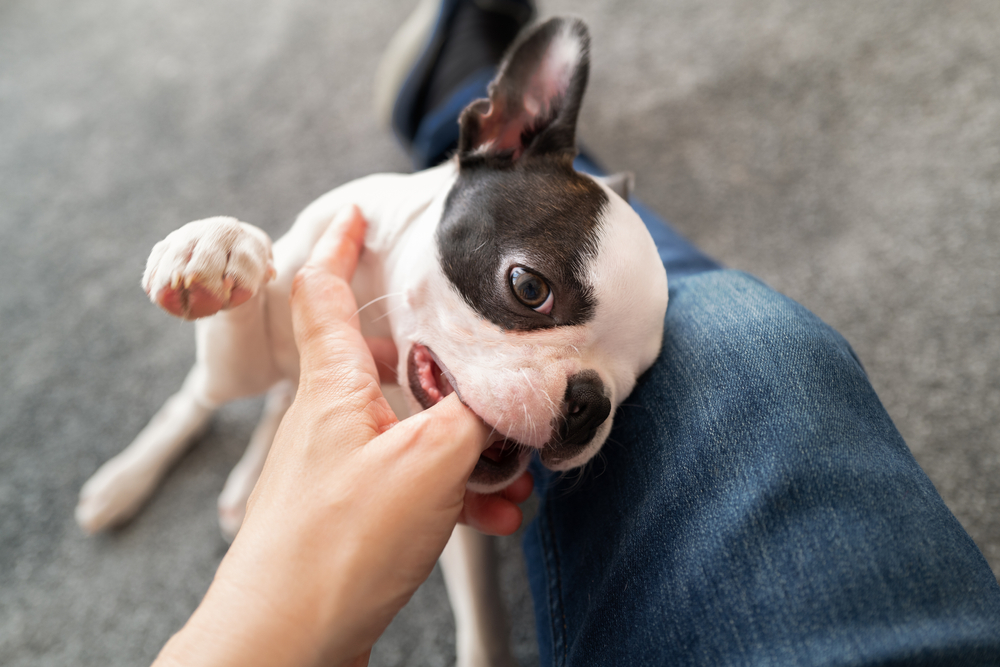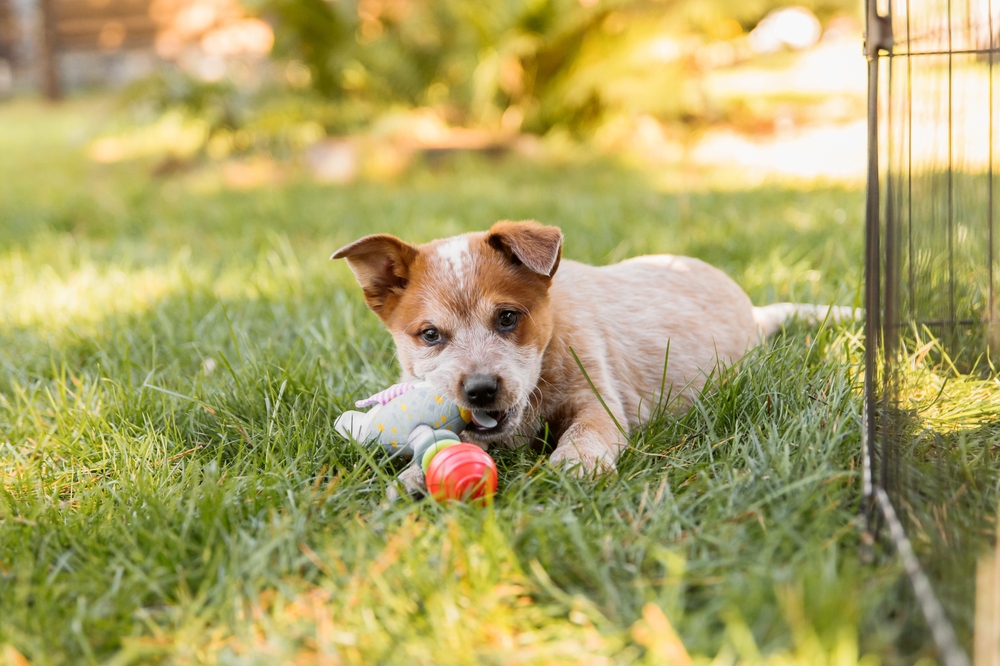Welcoming a new puppy into your home is a heartwarming experience until those playful little nips start to leave bruises. Puppy biting is normal, but it quickly becomes frustrating if not addressed early. At Canine Wise, we know firsthand how overwhelming those sharp teeth can feel, especially when you're just trying to bond with your new best friend. This guide will walk you through simple, proven techniques to manage and stop puppy biting before it turns into a long-term habit. Whether your pup is teething, exploring, or testing boundaries, understanding the why behind the behaviour is key.
From redirection tools to positive reinforcement, we’ll help you set clear boundaries in a way that’s gentle, effective, and tailored for busy households. Let’s get you and your pup off to a calmer, bite-free start.

Understand Why Puppies Bite
Before you can stop your puppy from biting, it’s important to understand why they’re doing it. For many pet owners, it’s easy to mistake biting for misbehaviour when it’s actually a natural part of a puppy’s development. From exploring the world to dealing with sore gums, puppies use their mouths to interact with their environment and with you. Understanding the cause helps you respond calmly and consistently, which is key for long-term success. Let’s take a closer look at the most common causes:
Teething & Curiosity
Between 3 and 6 months, teething discomfort drives puppies to chew whatever they can reach. But teething isn’t the only reason they’re mouthing everything in sight. Puppies are naturally curious and use their mouths as a tool for discovery. In a bustling city like Sydney, where dogs may be exposed to a wide range of new environments, smells, and people, this instinct can be especially strong.
- Chewing helps relieve teething discomfort. Your puppy might gnaw on furniture, shoes, or hands to soothe sore gums.
- They explore the world with their mouths. Everything is new and exciting, and biting helps them understand textures, tastes, and reactions.
- Cold items provide relief. Frozen toys or wet washers can be appealing to teething pups.
Tip: You can also rotate in frozen chews that they already enjoyed from teething phases.
Social Learning
Puppies aren’t born knowing how to interact politely; they learn by playing with their littermates and through your guidance. In play, they nip and bite, but they also learn boundaries. If a bite is too hard, a sibling yelps or walks away. Without that early social feedback, your pup needs you to step in. Many puppies adopted may come from different environments and might not have had enough time with their litter. That’s why it’s important to teach acceptable behaviour early.
- Play biting teaches bite inhibition. Puppies learn how hard they can bite without hurting.
- Mimicking yelps can help. A short, high-pitched "ouch!" can simulate how a littermate would react, letting them know the bite was too hard.
- Consistent feedback is key. Everyone in the household must respond the same way to bites, no mixed messages.
Insight: Local puppy classes can offer controlled environments for social learning with other dogs.
Attention & Energy
Not all biting is playful or exploratory. Sometimes, it’s your puppy’s way of demanding your attention or letting off steam. Puppies have tonnes of energy. If they don’t have enough to do, they’ll find ways to entertain themselves, often with their teeth. This type of biting can show up when you’re busy, on the phone, or walking around the house. To your pup, even a negative reaction reinforces nipping. It’s important to avoid reinforcing this behaviour by staying calm and redirecting them instead.
- Biting often gets a reaction. Even scolding can feel like attention to a puppy.
- Overstimulation leads to nipping. When they get too excited or haven't had enough rest, puppies may resort to biting.
- Exercise helps prevent boredom. A tired puppy is far less likely to bite just for fun.
Local tip: Take advantage of dog-friendly spaces for walks, playtime, and puppy training sessions.
Simple and Effective Ways to Stop the Biting
Rather than punishing your puppy, the goal is to teach them what’s acceptable in a way they can understand. Different techniques are not only effective but also easy to implement into your daily routine, no matter where you are in your training journey. Here are four strategies that many dog owners have found helpful and reliable:
Chew Alternatives
When you consistently redirect their biting to appropriate toys or frozen chews, they’ll start to learn what’s fair game and what’s off-limits. Keep chew toys handy before biting starts. This is important during teething phases when their urge to chew is at its peak.
- Keep a chew toy within reach at all times. Offer it immediately when biting begins.
- Use toys with different textures. Rope toys, rubber chews, and teething bones can keep them engaged longer.
- Frozen treats help teething pups. Soak a clean cloth in water or broth and freeze it for a cooling chew option.
Tip: Explore local pet stores or weekend markets for handmade or eco-friendly chew toys suited for puppies.
Clear Signals
In the same way they’d learn from littermates, using consistent vocal feedback teaches them when they’ve gone too far. Stay calm and make it clear biting isn’t okay without scaring them. Many owners find this method useful during indoor play sessions when nipping happens more often due to proximity and excitement.
- Say “no” in a calm, firm tone. Avoid yelling, which can overstimulate or frighten them.
- Pause after your signal. Give your puppy a few seconds to process what just happened.
Training tip: Be mindful of your body language because tense reactions may escalate excitement. Keep your posture relaxed while giving your cue.
Pause Play
Sometimes, the most effective teacher is silence. Puppies quickly learn that if biting leads to fun-stopping, it’s not worth doing. This works well for excitable pups that bite from overstimulation or to get attention. Rather than scolding or pushing your puppy away, calmly stopping the interaction sends a strong message without adding more energy to the situation.
- Stand up and turn away. Don’t engage or make eye contact.
- Leave the room if needed. A short break gives both of you a reset.
- Resume play only after calm behaviour. This reinforces that gentle play gets rewarded.
Insight: Use this technique consistently at home and in public spaces like leash-free parks, so your puppy associates biting with losing access to play wherever you are.
Reinforce Good Behaviour
While correcting biting is important, reinforcing gentle behaviour is what really shapes your puppy’s habits. The more you reward good behaviour, the more likely they’ll repeat it. Use treats, praise, and affection to show your pup that staying calm and keeping their teeth to themselves is a win. It’s not just about rewards; it’s about timing. The faster you praise the right behaviour, the clearer the message will be for your puppy.
- Use small, healthy treats. Reward immediately after gentle play or stopping a bite.
- Pair treats with verbal praise. Say “good boy!” or “nice job!” in a cheerful tone.
- Pet or cuddle gently. Some puppies prefer physical affection over food.
Pro tip: Keep treats in easy reach during playtime. You can clip a treat pouch to your belt or leave a bowl nearby for quick access.

What to Avoid and When to Get Help
While it’s important to teach your puppy what to do, it’s just as important to avoid actions that can confuse, scare, or even reinforce unwanted biting. In many homes, well-meaning owners unknowingly make mistakes that worsen biting behaviour instead of curbing it. To raise a well-adjusted dog, it’s crucial to guide with consistency, not fear, and know when it’s time to call in expert support. Let’s look at some mistakes to avoid and the warning signs that it’s time to seek professional help.
Avoid Harsh Reactions
It can be tempting to scold, shout, or even physically correct your puppy when they bite. However, harsh punishment can do far more harm than good. Instead of teaching your pup, it may trigger fear, anxiety, or aggression, especially during crucial developmental stages. A fear-based response to humans can create long-term behavioural issues.
- Never hit, slap, or tap the snout. It might stop the behaviour briefly, but it damages trust and can trigger aggression.
- Fear-based learning backfires. Dogs that learn through fear may become withdrawn, reactive, or harder to train later.
Better alternative: As mentioned earlier, calmly ending play sends a clearer message than scolding.
Skip Rough Games
Games like tug-of-war, wrestling, or letting your puppy chase your hands might seem harmless and fun, but they can blur boundaries and encourage biting behaviour. Puppies get excited fast, and these games often reinforce the idea that teeth on skin are part of play. This is necessary for families with young children, where unintentional rough play can lead to nips that scare or hurt.
- Avoid using hands as toys. This sends mixed signals. Stick to chew toys like those mentioned earlier to set clear boundaries.
- Stop playing if your puppy gets too excited. Prevent things from escalating into biting.
- Discourage chasing games involving limbs. Let them chase toys, not feet or pant legs.
Play smart: Use flirt poles, treat puzzles, or fetch to entertain your pup without encouraging physical contact with hands or clothing.
Know When to Ask for Help
Some puppy biting is normal, but if it becomes excessive, escalates in intensity, or starts to feel aggressive, it’s time to reach out. Behavioural issues that aren’t addressed early can be much harder to fix later. Professional trainers and vets in Sydney can help you identify the root cause and tailor a plan to your puppy’s needs.
- Seek help if biting breaks skin or draws blood.
- Consult a vet if biting is paired with growling, guarding, or stiff posture. This may point to pain or deeper behavioural issues.
- Work with a certified trainer for targeted support. They can observe your puppy’s body language and triggers in real time.
Tip: Look for local trainers certified in positive reinforcement methods. Many offer puppy packages or home visits.
In conclusion, puppy biting may be natural, but how you handle it sets the tone for your dog’s lifelong behaviour. With calm corrections, consistent signals, and lots of positive reinforcement, you’re shaping not just manners, but also trust. If you're ready to bring peace back to your home, get in touch with Canine Wise today and start your journey to a happier, bite-free bond.


